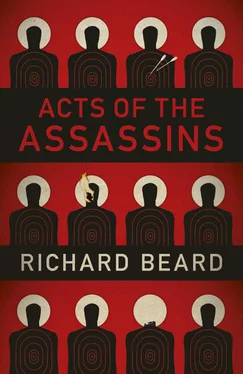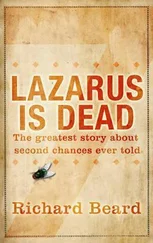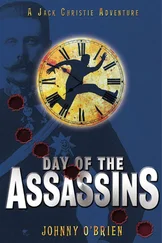‘You had a message?’
The teacher wants to be somewhere else, but she can’t shake off her habit of encouragement, even with grown men.
‘I’m sorry,’ Gallio says. ‘Yes, I do.’
He is aware of staring, of seeing a new human being who is neither himself nor her mother, and of not being able to get his message across. One day I’ll die, he’d like to say, though obviously that’s not the place to start. What he means is Alma should spend his military pension on a sunny villa in a civilised territory where people are safe and well. Take love where you find it, he wants to tell her, because if not for that what can life be for? Succeed where I have failed.
Alma smiles and the miserable look doesn’t run in the family. She wants to put him at his ease, whoever he may be, but he’s not a competent dad full of wise advice. The teacher looks at her watch.
‘Don’t worry,’ Gallio manages.
‘Why not?’
A reasonable question, and if he answered he’d sound like a dad: because in the long or short time that remains to us there will be good moments as well as bad. Gallio doesn’t know if this is true, but it seems the end of the world makes him hope for the best. He says: ‘The message. I’ve forgotten to give you the message.’
The teacher has to prompt him. ‘It’s from Baruch. We need to be getting back into lessons.’
Alma’s face changes. The miserable look does run in the family after all. ‘Is he angry? Again?’
‘He’s not angry. He’ll be a few minutes late.’
‘But it’s not his day,’ she says. ‘He hasn’t fetched me for weeks.’
‘Well that’s what he said.’
Gallio is saved by his phone. As it rings he makes a show of fumbling it out of his pocket, and then he’s walking away, pointing at the phone and at his ear to explain what he’s doing. He waves and answers at the same time, making his escape, a solid lump of emotion in his chest. He doesn’t know what the emotion is, but to feel it coming is feeling enough, and he regrets calling his daughter out of school. He doesn’t know what he was thinking.
The call is from Claudia: ‘For once. You have your phone turned on and you answered it.’
‘What happened? Is James on the move?’
‘Not James. Paul. We forgot he’s a trained operative. He picked up on Baruch and recognised him from the old days. He sent his bodyguard over for a chat. Paul wants our protection.’
They schedule a meeting for 15.45 in the Israel Museum. Claudia stays in the van, eyes on James, while Cassius Gallio dresses up. Unlike the disciples, Paul likes to mix with men in suits, and in the designated room — Feasts and Miracles — Gallio greets Paul with a handshake. The file says he was once a tentmaker, but not recently, and Gallio holds Paul’s soft preacher’s hand for longer than he should.
‘You already know Baruch,’ Gallio says. ‘What can we do for you?’
‘Not here,’ Paul says.
He’s a professional. Never talk in a room where the opposition arranged the meet. Paul turns and sets a discreet browsing pace from Dawn of Civilisation through to Land of Canaan . Despite the air conditioning Israel is heavy with history, and remnants of the old days always break through into now. Brand new building, ancient objects.
Whether Paul turns left or right, walks straight on or doubles back, the bodyguard stands close enough to make a difference, and Paul is complicated in ways that Gallio admires. He doesn’t have the simplicity of the disciples, and has been surprised by Jesus, blinded by him. Paul has experienced the hurt that Jesus can cause, and he and Gallio have this knowledge in common. Paul surely has his reasons for employing a bodyguard.
‘First of all,’ Paul says. ‘I had nothing to do with the murders of Jude, Thomas or Philip. I have solid alibis and witnesses.’
He chooses to talk while walking, into Illuminating the Script and out through Costume and Jewellery . Baruch sometimes gets ahead of him, walks backwards, fails to blink his Old Testament eyes. Baruch’s mind is stuck on a single thought, and out it comes in The Cycle of the Jewish Year . ‘I remember when you were Saul. You killed Stephen in the street.’
‘I changed my name, like Peter did. Simon to Peter. Saul to Paul. Saul is long dead.’
‘You kill him too?’
‘In a manner of speaking.’
‘Nothing changes, then.’
Gallio registers the intensity between Baruch and Paul, neither man prepared to compromise on their version of the past. He searches for common ground. ‘No one else needs to die,’ he says. ‘The situation is bad enough already.’
‘Seven disciples left.’ Baruch wants only to provoke. ‘One suicide, four murders, those poor defenceless believers, all gone under.’
‘Which is why we need to talk,’ Paul says.
‘Barbarous deaths,’ Baruch says, ‘in outlandish places. Not pleasant at all.’
‘I need protecting from these assassins.’
‘You have a bodyguard.’
‘One man is not enough.’
‘You have your god.’
‘Philip had god on his side,’ Paul says. ‘I’m sure of that. He also had a skewer through the back of his legs.’
Paul decides they’ve walked enough, and in Modern Art he takes a rest on a leather bench facing Salvador Dali’s ‘Immaculate Conception’. He is as inattentive to surrealism as to seventeenth-century bridal caskets, and acts in all these galleries as if he is the dominant attraction. Gallio sits down next to him. He places a foot on his knee and holds his bony ankle. Straightens out his black sock. He’s about to speak but again Baruch is quicker.
‘You’re one of us,’ Baruch says. He does not sit down, or betray an interest in abstract art. ‘When they killed Stephen you held the coats of the murderers. You can look after yourself.’
‘I’ve been forgiven my past,’ Paul says. ‘Though obviously not by you.’
‘We do not forgive defectors, nor do we forget them.’
‘No fighting, please,’ Gallio says. He revolves his black shoe and thinks it could do with a polish. ‘Not in a public gallery of the Israel Museum. We can protect you, Paul, but you have to give us something in return. Politics. You’ll understand the politics. Where can we find Peter?’
‘I don’t know. We’re not in regular contact.’
‘Maybe you should be, if you want us to offer you protection.’
‘Honestly, I know everything and everyone, but I haven’t heard from Peter in a long time. He’s disappeared off the face of the earth.’
‘Liar,’ Baruch says. ‘Always were, always will be. The Jerusalem security services pick out the finest liars at a very young age.’
Paul’s secretary scuttles in from Oceanic Art with a pile of letters on a silver tray. Paul waves them away, then calls the man back, looks more closely at the letter on top (address, back of envelope, front) then drops it and waves the man away again. ‘Peter may have died, of course. The disciples of Jesus are not immune from natural causes.’
‘Or unnatural ones.’ Gallio pulls his ankle higher up his thigh, doubtful that natural death is an event the disciples are likely to experience. ‘But you’re not in the same danger, are you, Paul? You should be happy. You’re not a disciple so you’re probably safe.’
‘I met Jesus like they did.’
‘But you didn’t, did you? Not properly in Galilee. The disciples were chosen when Jesus was alive, and they worked and travelled as a group. You’re a latecomer, not in the same category. You’ll be fine.’
Paul slaps Gallio on the knee, indulging him, acknowledging Gallio’s boldness in teasing the mighty Paul of Tarsus. Except his hand stops on Gallio’s knee, grips, and Gallio is made aware of the Saul from a darker lifetime. Paul does not take kindly to suggestions he’s second best, especially when the lesser disciples can barely explain the Trinity.
Читать дальше












